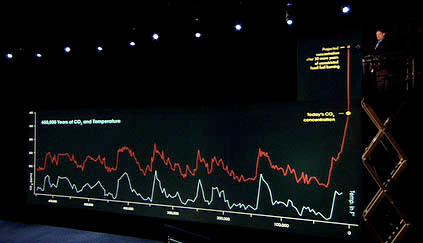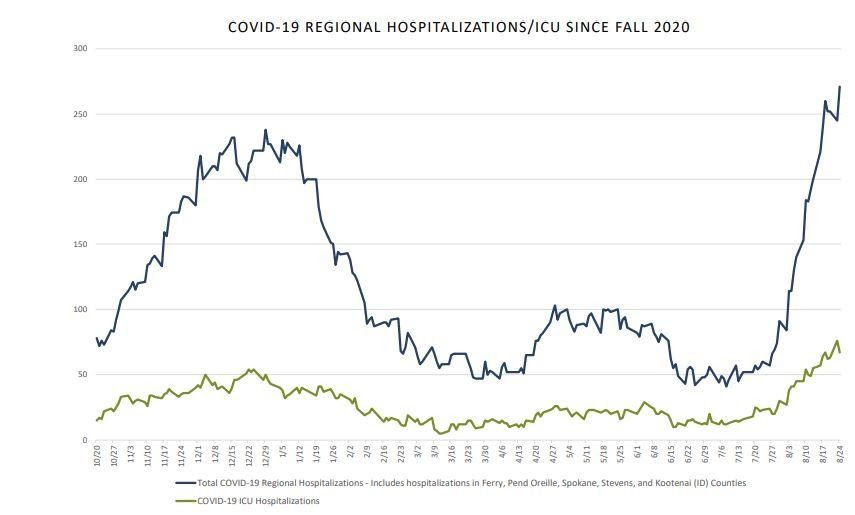Like Al Gore on a scissor lift
ADDITIONAL CONTEXT | The west is too expensive, the hospitals are too full, Hoopfest is too dangerous, and somewhere in Washington, jail administrators are coaxing inmates to get vaccines with ramen.
Remember the part of An Inconvenient Truth where Al Gore has to use a scissor lift to demonstrate the scale of CO2 accumulation in the atmosphere? One of the nerdiest and most effective visuals in cinematic history.
Basically every graph we see these days — from the hospitalization numbers in NE Washington to the home prices … pretty much everywhere — is giving off big scissor lift vibes. Here’s hoping we respond more quickly to these existential threats than we did to Uncle Al’s multi-million-dollar Powerpoint. — Luke
WHO GETS TO BE A LOCAL ANY MORE?
Our latest episode of the podcast dropped Wednesday, and boy does it feel timely.
We spoke with University of Idaho sociologist Ryanne Pilgeram about her book Pushed Out, which outlines the underlying economic processes that have turned rural working class towns into resort communities, drawing in amenity migrants and displacing people who have lived in the Idaho panhandle for generations. These forces have quietly driven rural gentrification for decades, and they have been severely exacerbated by the pandemic, to the point that median home prices in Bonner County, Idaho, have nearly doubled in the last two years to $675,000. This, in a region where the median family income is under $51,000.
Then today, the Guardian comes out with a huge feature on Bozeman, a city where some of the wealthiest people in America have multi-million-dollar vacation homes and locals are increasingly homeless.
Similar things are happening across the West. In the former smelter town turned resort mecca of Ketchum, Idaho, affordable housing is so hard to come by local officials briefly suggested creating a tent city for the town’s nurses and firefighters.
Listen to RANGE here, or subscribe wherever you get your podcasts. Buy Pilgeram’s book directly from the publisher. — Luke
Related: Census 2020 data illustrates Idaho’s urban, rural divide
MANDATE UPDATES
So much happened in coronavirus stuff this week there’s no way to wrap it into a clever narrative, so forgive the bullet-points:
The encouraging news
The F.D.A. grants full approval to the Pfizer-BioNTech Covid-19 vaccine. (Pfizer promptly gives it a name that sounds more like a multi-level marketing company than a medicine.)
On the heels of the approval, WSU prohibits personal COVID-19 vaccine exemptions for students. (Spokesman)
People have been really enjoying outdoor concerts at the pavilion. Starting Oct. 1, those concerts will require proof of vaccination (Spokesman)
Following Washington State, New York City is expected to require shots for all education staff, including teachers and principals. (NYTimes)
The sad news
Hoopfest is cancelled. (Inlander)
The bad news
Spokane Valley anti-mask protest erupts after Inslee's new COVID-19 mandates. (Spokesman)
Montana is the only state to ban vaccine requirements for employees (Seattle Times)
After an emergency meeting that was frequently contentious, the North Idaho College board of directors voted 3-2 to overturn a mask mandate instituted by the college president. This feud has been going on since November and has drawn national attention. We covered the background on the podcast in April.
And then there’s this:

DO NO HARM
Last week, the Seattle Times reported that fatigue is once again pervasive across our entire statewide health system. Now, though, with vaccines in wide distribution and access about as easy as it could possibly be, the stress is turning from burnout to bitterness, with many healthcare workers noting that the surge is being fueled by people who have turned down the vaccine, but readily ask for help once they’re infected.
And while it’s the job of professionals to put those feelings aside when it comes to care, the mere act of providing care for patients is getting much harder in the Inland Northwest. In Ferry, Stevens and Pend Oreille counties, hospitalizations have soared beyond the previous peak in December and the health system is at a breaking point.
“If you look at the curve this time, it’s almost going straight up and we haven’t even hit the peak yet,” Northeast Tri County Health Officer Sam Artzis told Spokane Public Radio, “we’re under a great deal of stress right now.” Stevens County has the lowest vaccination rate in the state.
Across the border, Idaho public health officials are begging people to get vaccinated as hospitals get closer and closer to adopting “crisis standards of care” — meaning healthcare rationing based on a set of triage criteria:
Idaho came close to having to implement this protocol last year but the infection peak stopped just short. — Luke
LOPSIDED INCENTIVES
Two jail-related stories out of Washington State this week stood out to us due to their jarringly lopsided incentives meant to entice prisoners and (potential) prison guards.
Benton County Jail, in Kennewick, launched a “Soups for Shots” program in August to incentivize COVID-19 vaccines among inmates. Inmates who get their first COVID-19 shot receive ten packets of ramen noodle soup.
The program is popular. So far, over 90 inmates (out of about 360) have taken the jail up on the instant-soup perk. Since one ramen package retails for about 28 cents, the noodle soup is a cost-effective “carrot.” Employees who came up with the idea are recommending the salty incentive to other jails in Washington too.
Meanwhile, 24 unfilled staff positions at Spokane County Jail and Geiger Corrections Center have caused Spokane County Detention Services to offer new hires signing bonuses of up to $10,000.
Spokane’s short-staffed jails have had a hard time finding people who want to work in the corrections field. They’re desperate for guards, as well as cooks and clerical positions. Non-guard positions would come with smaller signing bonuses (still in the thousands).
Spokane County Detention Services’ director Mike Sparber tells the Spokesman-Review:
“[S]ince the COVID-19 pandemic, hiring has gotten even worse. Sparber said an increase in anti-law enforcement sentiment in the last few years has probably played a role, too.”
Relatedly, Spokane County Sheriff’s Office has been attempting to recruit new cops with $15K starting bonuses, placing billboard ads in cities like Denver and Portland.
But have they tried offering soup? —Elissa
SOME GOOD NEWS, FOR ONCE
It’s official! The Spokane road that, for decades, bore the name of genocidal US Army General George Wright has been renamed Whistalks Way, in honor of the Indigenous woman warrior Whist-alks, who faced General Wright in the mid-1800s. Though Gen. Wright killed her husband, Qualchan, Whist-alks escaped by horseback and survived, living “her final years at the mouth of the Spokane.”
In 2020, The Spokane City Council voted unanimously to rename the road. But the call to remove General Wright’s name came as far back in 1975, in an effort led by Spokane Tribe member and environmental activist Deb Abrahamson, who passed away this January.
Over 100 people gathered outside Spokane Falls Community College last Friday to celebrate the name change. The event also honored 70 Indigenous women whose contributions have helped their communities. Each honoree was adorned with a special purple scarf printed with an image of Whist-alks herself.
Speaking of removing genocidal historical figures from city properties! Walla Walla is currently accepting email comments about potentially doing away with the Christopher Columbus statue that stands on its County Courthouse lawn.

The Board of Walla Walla County Commissioners will take public comments about the Columbus statue until Sept. 13th. — Elissa
ACTION | Email public comments to: columbus@co.walla-walla.wa.us. Quill a sharply worded letter and snail mail to: Walla Walla County Commissioners, PO BOX 1506, Walla Walla, WA 99362.
OTHER STORIES WE’RE FOLLOWING
Meth, cocaine contamination found at Washington state toxicology lab, again.
And finally, speaking of Al Gore, some late-breaking good news:









